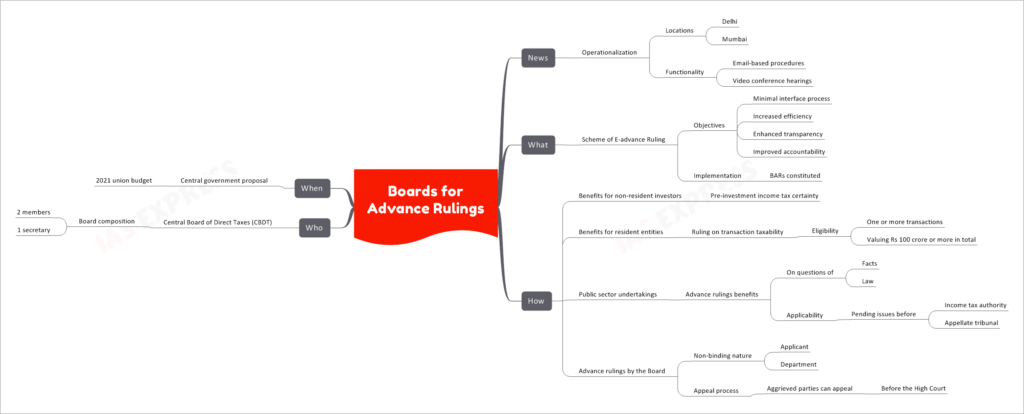Boards for Advance Rulings

The operationalization of Boards for Advance Rulings (BARs) brings a fresh approach to addressing tax-related uncertainties. Through email-based procedures and video conference hearings, BARs are set to enhance the efficiency, transparency, and accountability of the tax ruling process.
What are Boards for Advance Rulings (BARs)?
The Scheme of E-advance Ruling has introduced Boards for Advance Rulings (BARs) as a means to provide timely and authoritative rulings on complex tax matters. This initiative aims to minimize direct interactions and maximize the efficiency of the advance ruling process.
Objectives of the Scheme
- Minimal Interface Process: Reducing unnecessary interactions between taxpayers and tax authorities.
- Increased Efficiency: Expedited resolution of tax-related queries and concerns.
- Enhanced Transparency: Providing clear and transparent rulings on tax matters.
- Improved Accountability: Ensuring that the tax rulings are consistent and in line with the law.
Implementation of BARs
Boards for Advance Rulings (BARs) have been constituted to carry out the objectives of the Scheme of E-advance Ruling.
How Does BARs Benefit Taxpayers?
Benefits for Non-Resident Investors
Non-resident investors stand to gain pre-investment income tax certainty through the advance rulings provided by BARs. This certainty enables them to make informed investment decisions in the Indian market.
Benefits for Resident Entities
Resident entities can seek rulings on the taxability of their transactions, provided they meet specific eligibility criteria. The transactions in question must be valued at Rs 100 crore or more in total and can involve one or more transactions.
Public Sector Undertakings (PSUs)
Public sector undertakings can also benefit from advance rulings provided by BARs. These rulings apply to questions of both facts and law, and they cover issues pending before income tax authorities or appellate tribunals.
Advance Rulings by the Board
The rulings provided by BARs hold a non-binding nature. This means that while they provide guidance to the applicant and the tax department, they are not legally binding.
Appeal Process
Aggrieved parties, including both the applicant and the tax department, have the right to appeal against the ruling provided by BARs. Such appeals can be made before the High Court.
The Role of Central Board of Direct Taxes (CBDT)
The operationalization of BARs is a significant step forward, orchestrated by the Central Board of Direct Taxes (CBDT). This body consists of two members and one secretary, collectively driving tax policy and administration in India.
The Journey of BARs
The proposal for Boards for Advance Rulings (BARs) was introduced by the Central Government in the 2021 Union Budget. This initiative showcases the government’s commitment to providing a conducive and transparent tax environment for businesses and investors.
If you like this post, please share your feedback in the comments section below so that we will upload more posts like this.

